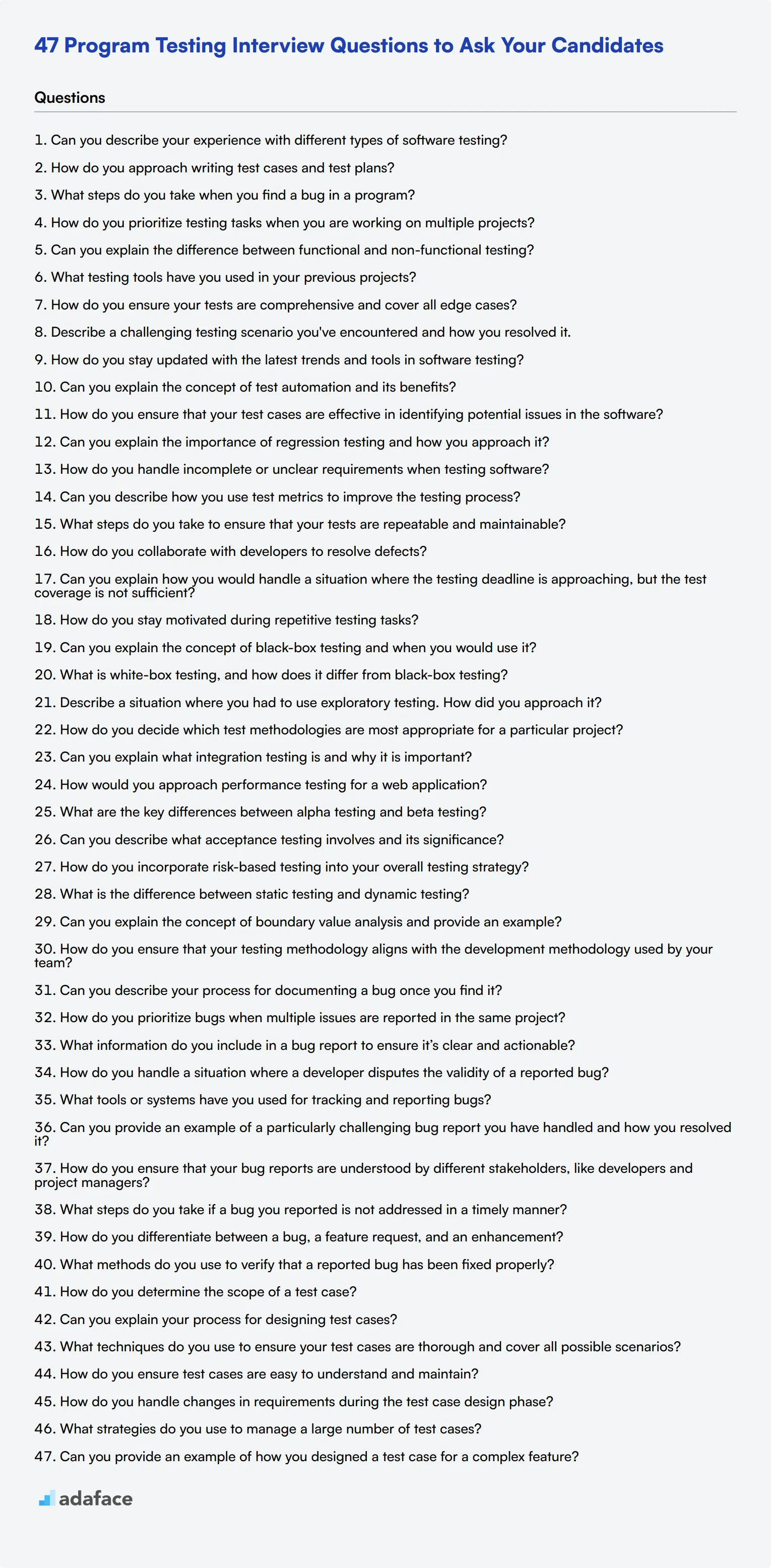Crafting the right Program Testing interview questions can be a game-changer in identifying the best candidates for your team. It’s as important as understanding the skills required for a software tester.
This blog post provides a comprehensive list of questions designed to evaluate candidates' capabilities in various areas of program testing. From initial interview questions to those focusing on test methodologies, bug reporting, and test case design, we've got you covered.
Leverage these questions to streamline your hiring process and make better-informed decisions. For a thorough evaluation, consider using our manual testing online test before the interviews.
Table of contents
10 Program Testing interview questions to initiate the interview
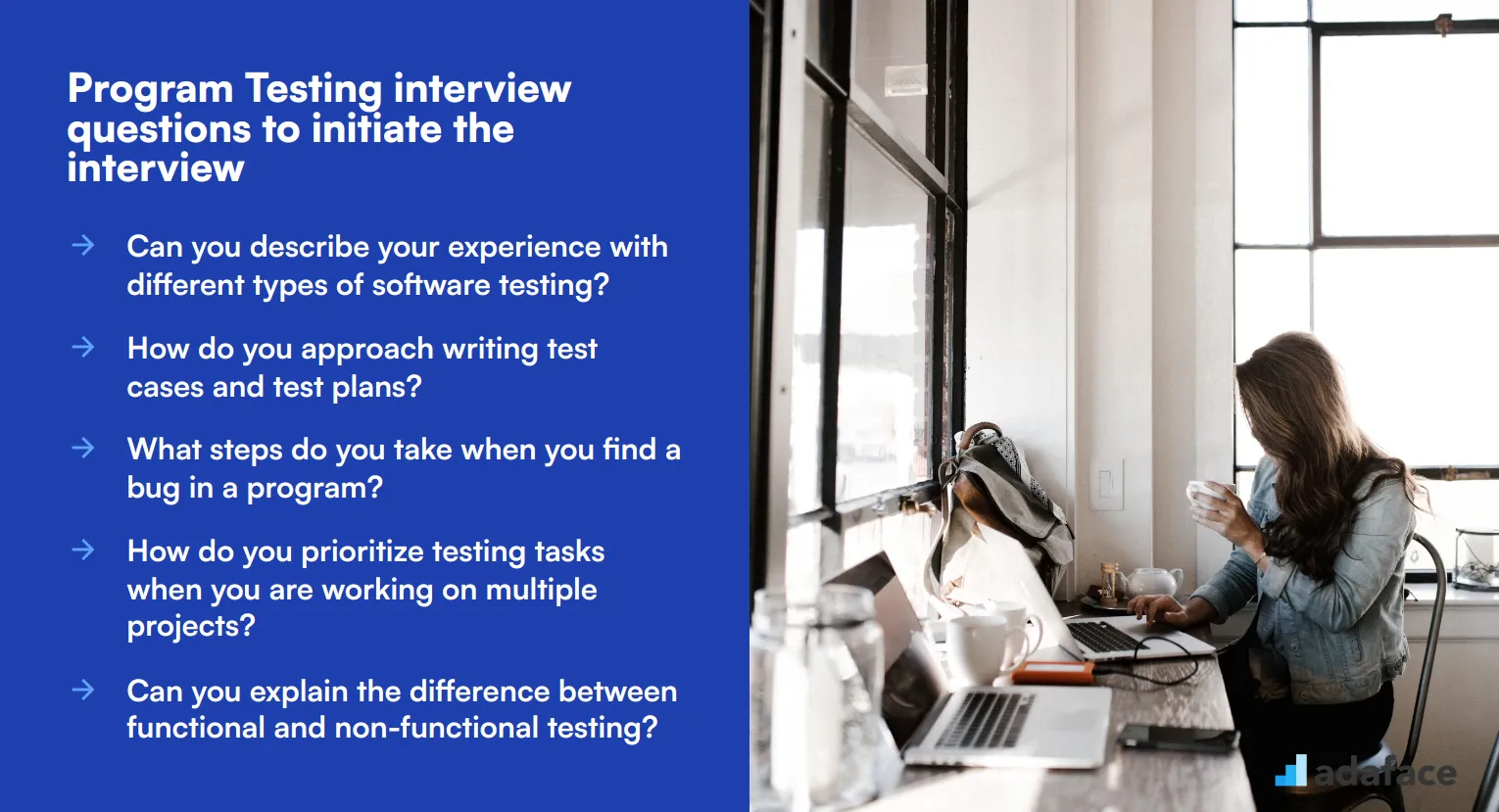
To ensure you hire the best candidates for your program testing roles, it's crucial to ask the right questions during the interview. These 10 Program Testing interview questions will help you gauge the technical skills and practical understanding of your applicants.
- Can you describe your experience with different types of software testing?
- How do you approach writing test cases and test plans?
- What steps do you take when you find a bug in a program?
- How do you prioritize testing tasks when you are working on multiple projects?
- Can you explain the difference between functional and non-functional testing?
- What testing tools have you used in your previous projects?
- How do you ensure your tests are comprehensive and cover all edge cases?
- Describe a challenging testing scenario you've encountered and how you resolved it.
- How do you stay updated with the latest trends and tools in software testing?
- Can you explain the concept of test automation and its benefits?
8 Program Testing interview questions and answers to evaluate junior testers
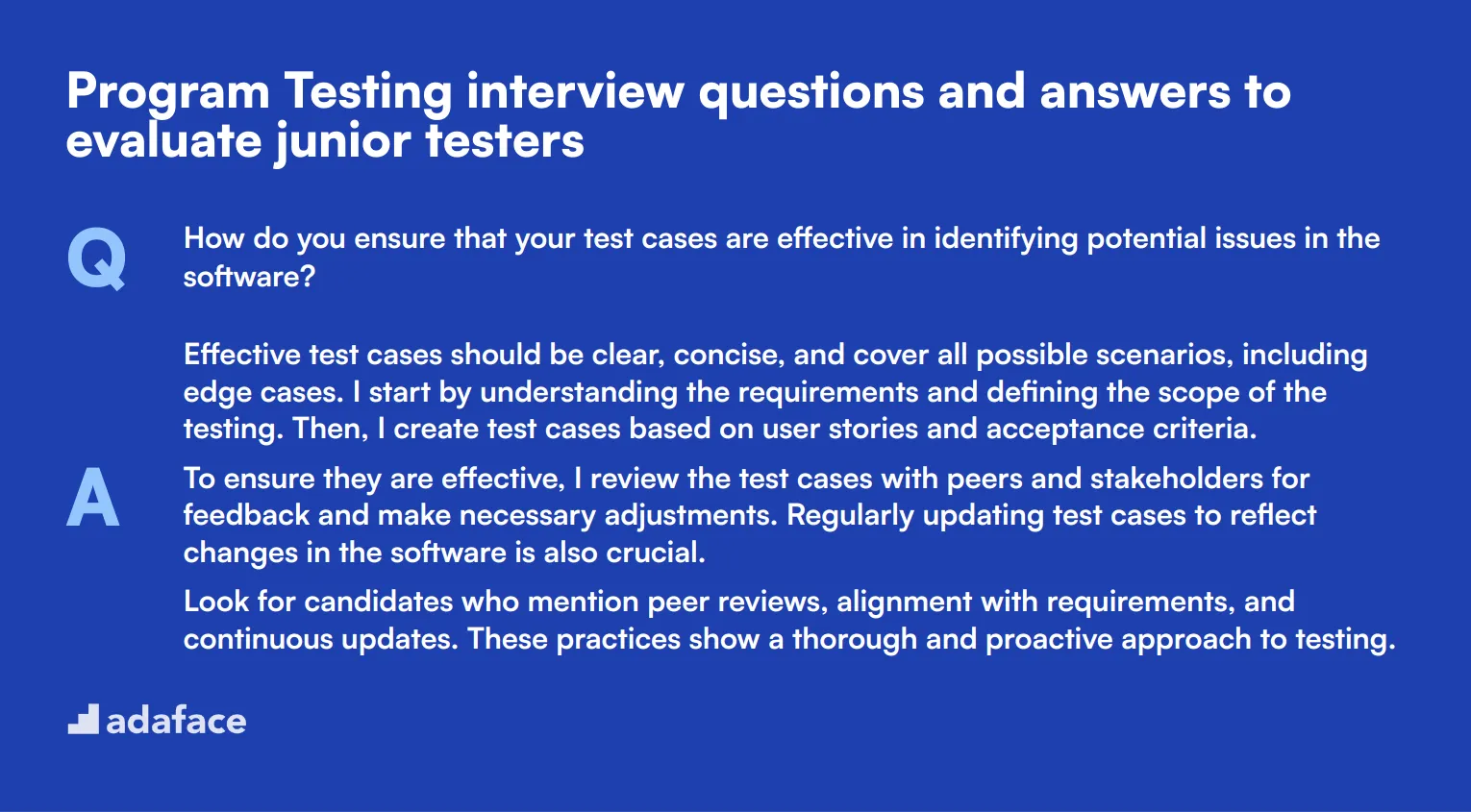
To find the perfect junior tester for your team, you need to ask the right questions during the interview. Our curated list of program testing interview questions will help you evaluate candidates' problem-solving skills, attention to detail, and understanding of testing processes. Use these questions to ensure you're hiring someone who can effectively contribute to your testing efforts.
1. How do you ensure that your test cases are effective in identifying potential issues in the software?
Effective test cases should be clear, concise, and cover all possible scenarios, including edge cases. I start by understanding the requirements and defining the scope of the testing. Then, I create test cases based on user stories and acceptance criteria.
To ensure they are effective, I review the test cases with peers and stakeholders for feedback and make necessary adjustments. Regularly updating test cases to reflect changes in the software is also crucial.
Look for candidates who mention peer reviews, alignment with requirements, and continuous updates. These practices show a thorough and proactive approach to testing.
2. Can you explain the importance of regression testing and how you approach it?
Regression testing is essential to ensure that new code changes do not negatively impact existing functionalities. It helps maintain software quality by detecting bugs introduced by recent updates.
I approach regression testing by first identifying critical areas of the software that could be affected by the new changes. I then prioritize test cases based on the impact and run them to verify that everything works as expected.
An ideal answer should highlight the candidate's understanding of the significance of regression testing and their ability to prioritize and execute it efficiently. Look for specific examples or experiences.
3. How do you handle incomplete or unclear requirements when testing software?
When faced with incomplete or unclear requirements, communication is key. I first seek clarification from the stakeholders, such as product owners or business analysts, to get a better understanding of the expectations.
If clarification is not immediately available, I use my experience and judgement to create assumptions and document them. I also ensure these assumptions are verified as soon as possible to avoid any misalignment.
Look for candidates who emphasize strong communication skills and proactive problem-solving. They should also mention the importance of documenting assumptions for future reference.
4. Can you describe how you use test metrics to improve the testing process?
Test metrics provide valuable insights into the effectiveness of the testing process. I use metrics like defect density, test coverage, and pass/fail rates to assess the quality of the software and the efficiency of the testing process.
By analyzing these metrics, I identify areas that need improvement, such as gaps in test coverage or recurring issues. This helps me refine the testing strategy and focus efforts on the most critical areas.
Ideal candidates will demonstrate a clear understanding of various test metrics and their practical application in improving the testing process. They should provide examples of how metrics have driven positive changes in their past projects.
5. What steps do you take to ensure that your tests are repeatable and maintainable?
To ensure tests are repeatable and maintainable, I focus on creating clear, modular, and reusable test scripts. This involves writing tests that are independent of each other and can be executed in any order.
I also document the test cases thoroughly, including the setup, execution, and expected outcomes. Regularly reviewing and updating the tests to reflect changes in the software is also crucial.
Look for candidates who emphasize the importance of modularity, clear documentation, and continuous updates. These traits indicate a methodical and disciplined approach to testing.
6. How do you collaborate with developers to resolve defects?
Collaboration with developers is key to efficiently resolving defects. I ensure that I provide clear and detailed defect reports, including steps to reproduce, screenshots, and logs.
I also participate in regular meetings with developers to discuss the issues, understand their perspective, and work together to find a solution. Maintaining open and respectful communication is crucial for effective collaboration.
An ideal candidate will highlight their ability to communicate effectively with developers and provide detailed defect reports. They should also mention the importance of teamwork and mutual respect.
7. Can you explain how you would handle a situation where the testing deadline is approaching, but the test coverage is not sufficient?
In such situations, prioritization is crucial. I would first identify the most critical areas of the software that need testing and focus my efforts there. This may involve risk-based testing to ensure high-risk areas are covered.
I would also communicate with the stakeholders to explain the situation and potentially negotiate an extension if necessary. Additionally, leveraging automation can help speed up the testing process.
Look for candidates who demonstrate strong prioritization skills and effective communication with stakeholders. They should also mention the use of risk-based testing and automation as strategies to handle tight deadlines.
8. How do you stay motivated during repetitive testing tasks?
Staying motivated during repetitive tasks can be challenging, but I keep my focus on the end goal of ensuring software quality. I try to break down the tasks into smaller, manageable chunks and take regular breaks to avoid burnout.
I also look for ways to introduce variety, such as automating repetitive tasks or learning new tools and techniques. Staying engaged with the team and celebrating small wins also helps maintain motivation.
An ideal candidate will show resilience and a proactive approach to staying motivated. They should mention specific strategies, such as task breakdown, automation, and continuous learning.
12 Program Testing questions related to test methodologies
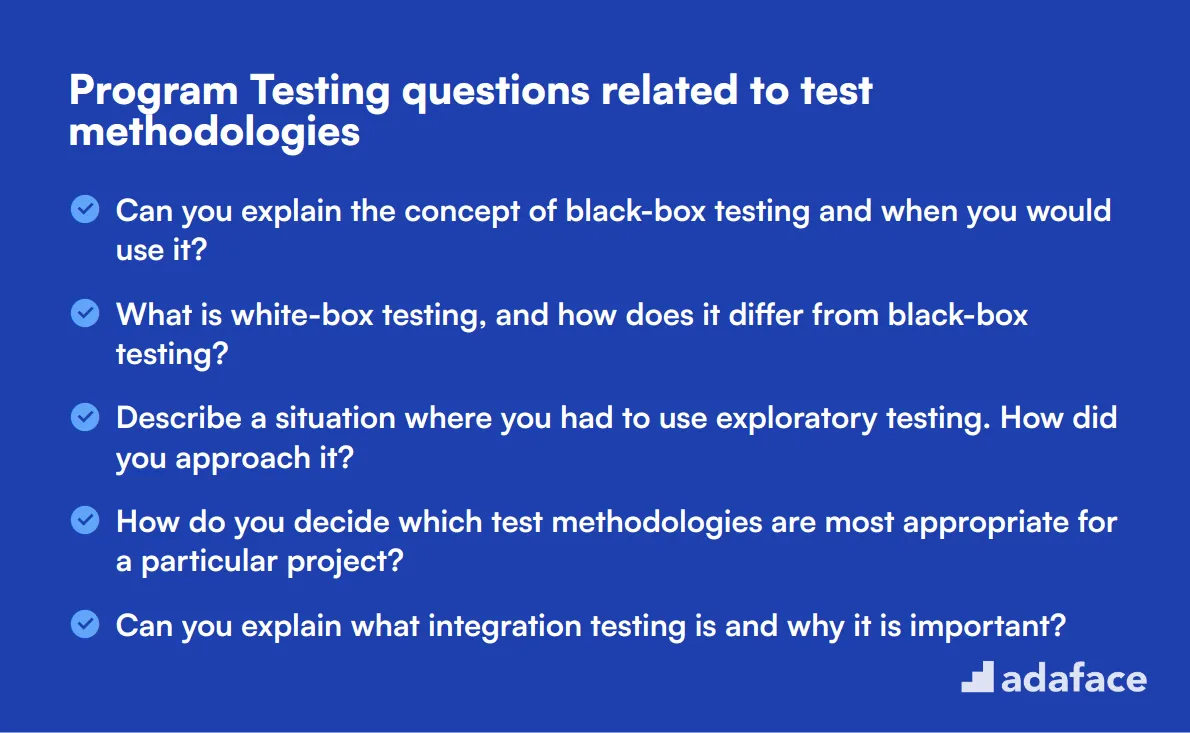
To ensure your candidates possess a strong understanding of test methodologies, ask them some of these 12 program testing questions. These questions can help you gauge their practical knowledge and ability to apply various testing techniques effectively. For more details, you can refer to our test engineer job description.
- Can you explain the concept of black-box testing and when you would use it?
- What is white-box testing, and how does it differ from black-box testing?
- Describe a situation where you had to use exploratory testing. How did you approach it?
- How do you decide which test methodologies are most appropriate for a particular project?
- Can you explain what integration testing is and why it is important?
- How would you approach performance testing for a web application?
- What are the key differences between alpha testing and beta testing?
- Can you describe what acceptance testing involves and its significance?
- How do you incorporate risk-based testing into your overall testing strategy?
- What is the difference between static testing and dynamic testing?
- Can you explain the concept of boundary value analysis and provide an example?
- How do you ensure that your testing methodology aligns with the development methodology used by your team?
10 Program Testing questions related to bug reporting
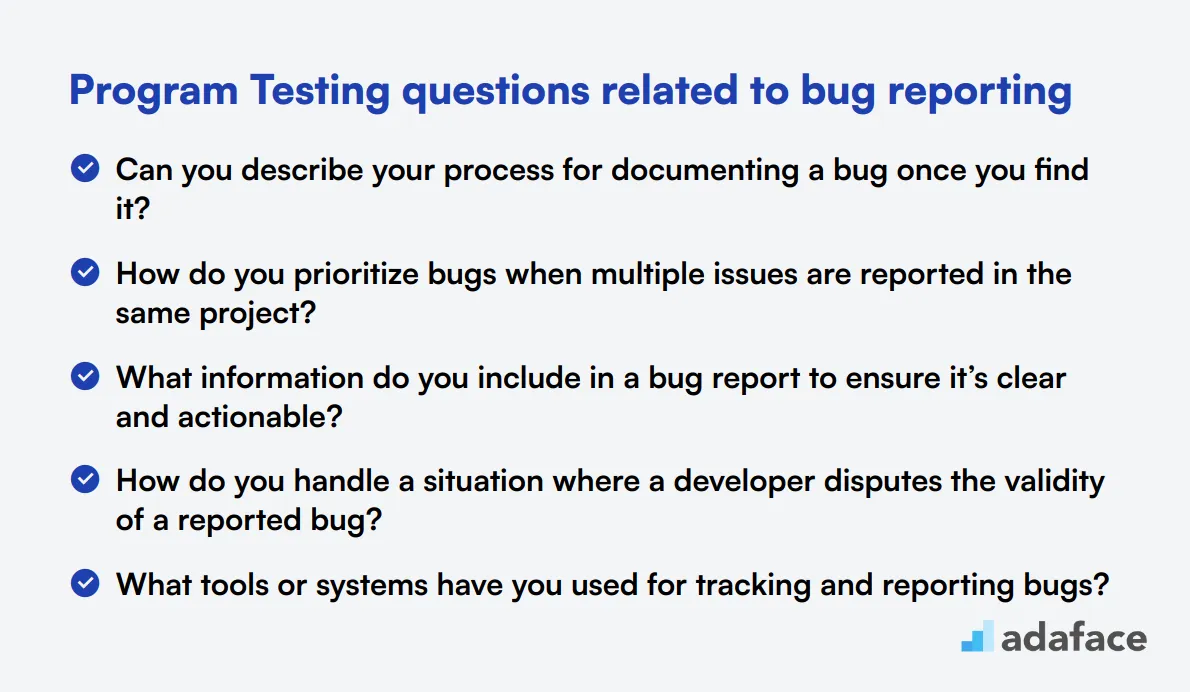
To ensure candidates possess the necessary bug reporting skills for roles such as quality assurance engineer, use these targeted questions. These questions will help you assess their ability to identify, document, and communicate defects effectively in a software development environment.
- Can you describe your process for documenting a bug once you find it?
- How do you prioritize bugs when multiple issues are reported in the same project?
- What information do you include in a bug report to ensure it’s clear and actionable?
- How do you handle a situation where a developer disputes the validity of a reported bug?
- What tools or systems have you used for tracking and reporting bugs?
- Can you provide an example of a particularly challenging bug report you have handled and how you resolved it?
- How do you ensure that your bug reports are understood by different stakeholders, like developers and project managers?
- What steps do you take if a bug you reported is not addressed in a timely manner?
- How do you differentiate between a bug, a feature request, and an enhancement?
- What methods do you use to verify that a reported bug has been fixed properly?
7 Program Testing interview questions and answers related to test case design
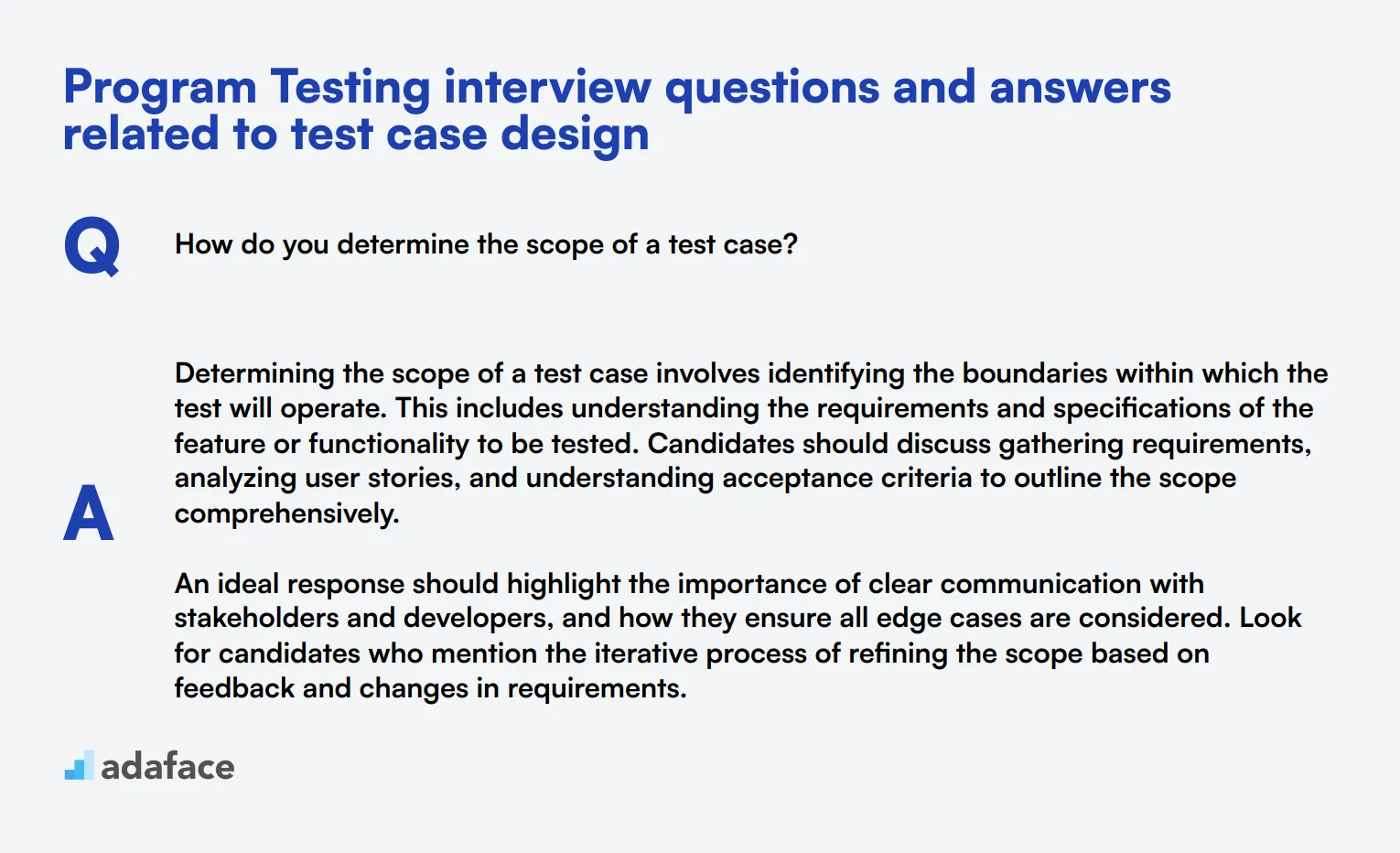
To ensure your candidates possess the right skills for designing effective test cases, use this list of program testing interview questions. These questions will help you gauge their understanding and approach to creating thorough and efficient test cases, crucial for maintaining software quality.
1. How do you determine the scope of a test case?
Determining the scope of a test case involves identifying the boundaries within which the test will operate. This includes understanding the requirements and specifications of the feature or functionality to be tested. Candidates should discuss gathering requirements, analyzing user stories, and understanding acceptance criteria to outline the scope comprehensively.
An ideal response should highlight the importance of clear communication with stakeholders and developers, and how they ensure all edge cases are considered. Look for candidates who mention the iterative process of refining the scope based on feedback and changes in requirements.
2. Can you explain your process for designing test cases?
Designing test cases typically starts with understanding the requirements and the functionality to be tested. Candidates should mention steps like identifying test scenarios, defining test objectives, and creating test data. They should also discuss the importance of prioritizing test cases based on risk and impact.
A strong answer will include how they document the test cases clearly, making them easily understandable and maintainable. Look for examples of past experiences where their test case design uncovered critical bugs or improved test coverage significantly.
3. What techniques do you use to ensure your test cases are thorough and cover all possible scenarios?
To ensure thorough test coverage, candidates might use techniques like boundary value analysis, equivalence partitioning, and state transition testing. These techniques help in identifying the most critical test cases that cover a wide range of input scenarios and edge cases.
Ideal candidates will also mention peer reviews and walkthroughs as part of their process to ensure nothing is overlooked. Look for a mention of how they adapt and update their test cases based on feedback and changing requirements to maintain comprehensive coverage.
4. How do you ensure test cases are easy to understand and maintain?
Ensuring test cases are easy to understand and maintain involves writing clear and concise test steps, using consistent naming conventions, and including detailed descriptions for each test case. Candidates should also discuss the importance of keeping test cases updated as the software evolves.
Strong candidates will highlight the use of test management tools to organize and track test cases effectively. Look for responses that show they prioritize clarity and simplicity to facilitate easy handover and collaboration within the team.
5. How do you handle changes in requirements during the test case design phase?
Handling changes in requirements involves being adaptable and responsive. Candidates should describe their process for updating test cases in response to requirement changes, including re-evaluating the scope and impact of the changes on existing test cases.
An ideal answer will mention maintaining open communication with stakeholders to ensure any changes are well understood and accurately reflected in the test cases. Look for candidates who demonstrate a proactive approach to managing changes and minimizing disruption to the testing process.
6. What strategies do you use to manage a large number of test cases?
Managing a large number of test cases requires organization and effective use of test management tools. Candidates should discuss their strategies for categorizing test cases based on functionality, priority, and risk. They might also mention using automation to handle repetitive test cases and focus on more complex scenarios manually.
Look for responses that show a systematic approach to managing test cases, ensuring they are easily accessible and maintainable. Strong candidates will also emphasize the importance of regular reviews and updates to keep the test case repository current.
7. Can you provide an example of how you designed a test case for a complex feature?
Candidates should provide a detailed example of a complex feature they have tested, including the steps they took to design the test cases. This might involve breaking down the feature into smaller components, identifying key scenarios, and creating detailed test cases for each scenario.
A good answer will include specific challenges they faced and how they overcame them, such as handling dependencies or integrating with other systems. Look for candidates who can clearly articulate their thought process and the rationale behind their test case design choices.
Which Program Testing skills should you evaluate during the interview phase?
While a single interview may not reveal everything about a candidate's capabilities, focusing on key skills crucial for program testing can provide significant insights. Below, we explore the core skills that are important to assess during the interview phase to ensure a candidate's suitability for the role.
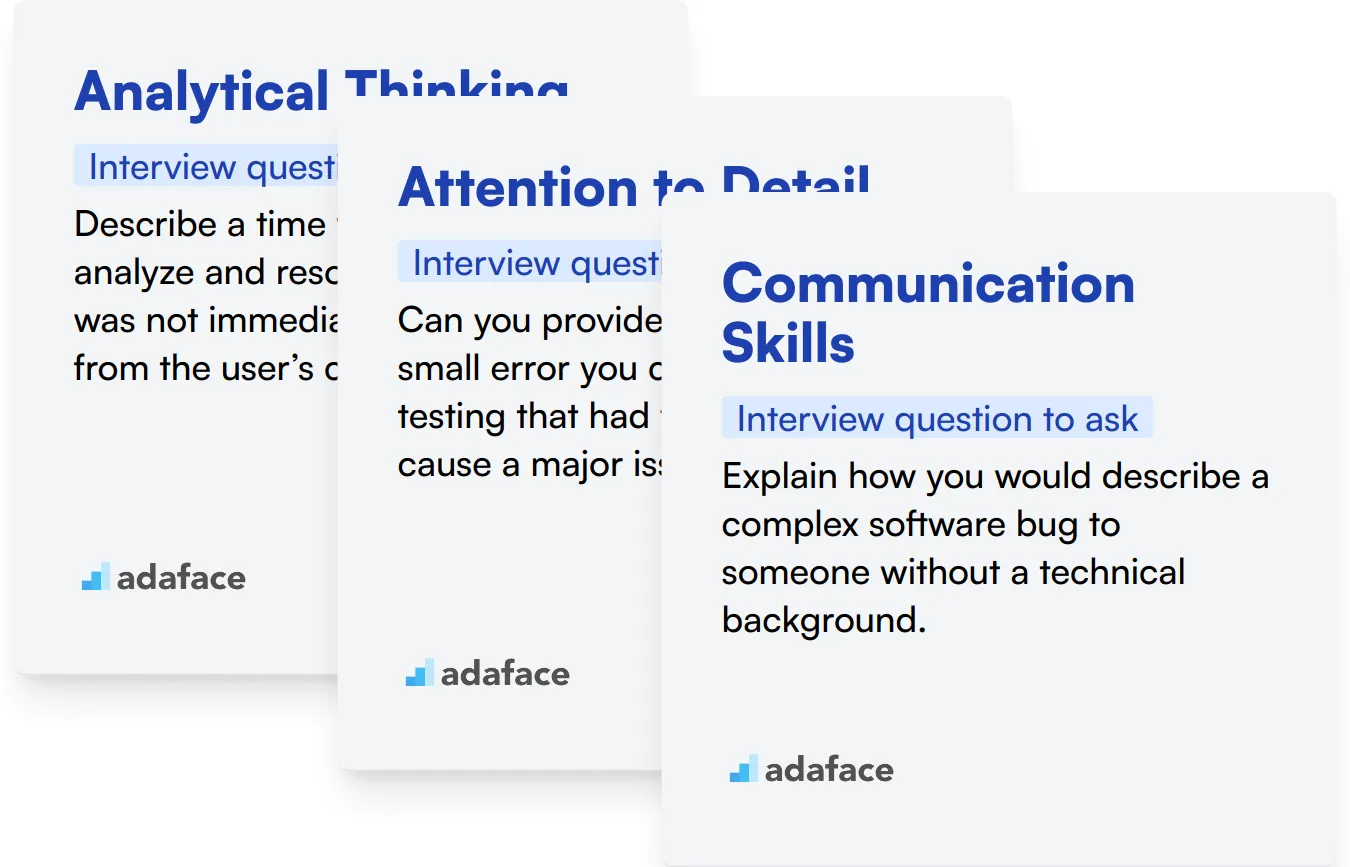
Analytical Thinking
Analytical thinking is the backbone of effective program testing. It enables testers to dissect complex software systems and understand the underlying structures to better predict where issues might occur.
You can evaluate a candidate's analytical skills through Program Testing assessments that include relevant multiple-choice questions designed to challenge their problem-solving abilities.
Further assessing this skill during the interview can be achieved by asking targeted questions. Here's an example question:
Describe a time when you had to analyze and resolve a bug that was not immediately apparent from the user’s complaints.
Look for detailed responses that show the candidate's process of breaking down the problem, applying logical deductions, and their persistence in solving the issue.
Attention to Detail
Attention to detail is vital in program testing as small mistakes can lead to significant software failures. Testers must meticulously check every aspect to ensure nothing is overlooked.
Consider using Attention to Detail tests to filter candidates who demonstrate high accuracy in identifying and correcting minute discrepancies.
To further evaluate this during an interview, consider the following question:
Can you provide an example of a small error you caught during testing that had the potential to cause a major issue?
High-quality answers should include specific instances that highlight the candidate’s ability to notice and rectify errors that others might miss.
Communication Skills
In program testing, clear communication is essential for documenting bugs and explaining their impacts to other team members, including developers and project managers.
An effective way to assess communication skills is to pose a question that simulates a real-world scenario:
Explain how you would describe a complex software bug to someone without a technical background.
Effective responses should be clear, jargon-free, and demonstrate the ability to convey complex information in an easily understandable manner.
Hire the Best Program Testing Candidates with Adaface
If you are looking to hire someone with program testing skills, you need to ensure they possess these skills accurately.
The best way to do this is to use skill tests. You can check our relevant tests like the QA Engineer Test or the Manual Testing Online Test.
Once you use these tests, you can shortlist the best applicants and call them for interviews.
To get started, head over to our sign up page or check our test library for more details.
QA Engineer Test
Download Program Testing interview questions template in multiple formats
Program Testing Interview Questions FAQs
Asking specific program testing questions helps identify candidates' proficiency in testing methodologies, bug reporting, and test case design.
Look for an understanding of basic testing concepts, problem-solving abilities, and a willingness to learn and grow.
Ask questions that cover various testing methodologies and assess the candidate's ability to apply these in real-world scenarios.
Questions should focus on the candidate's experience with bug tracking tools, their process for documenting bugs, and their communication skills.
Test case design is crucial as it ensures comprehensive coverage of the application and helps in identifying potential issues early.
Red flags include a lack of understanding of basic testing principles, inability to articulate testing processes, and poor problem-solving skills.

40 min skill tests.
No trick questions.
Accurate shortlisting.
We make it easy for you to find the best candidates in your pipeline with a 40 min skills test.
Try for freeRelated posts
Free resources




